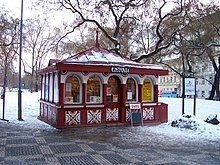Tobacco shop
A tobacconist (spoken almost exclusively Trafik , emphasis on the last syllable, plural tobacconists ) is in Austria a point of sale for tobacco products , newspapers , magazines , stationery , postcards and other small goods such as tickets for urban transport, and remote passenger train West train , also parking tickets for parking zones in Vienna. ASFINAG vignettes for using the motorways and expressways are also available in many tobacconists . The now abolished stamps could also be sold in tobacconists.
meaning

Only a few tobacconists have left postage stamps since the post office cut commissions. Most of them also act as lottery and toto acceptance points , for which approval from the monopoly administration is also required. A selection of tobacconists, labeled as Trafikplus tobacco shops, also sell event tickets from the booking systems of the two largest Austrian ticketing providers, Ö-Ticket and Wien-Ticket, as well as vouchers for, for example, the Styrian Thermenland, Dinner & Casino and thermal spa vouchers for all of Austria.
Only tobacco shops and tobacco sales outlets are allowed to sell tobacco products at the regular price. However, if there are not enough tobacconists in one area, other shops (tobacco sales outlets) are also given a sales permit. For restaurants and gas stations that purchase tobacco products at tobacco prices, the prices must be at least 10% higher.
Tobacco shops are expressly excluded from the legal ban on smoking in public places ( Section 13 Paragraph 4 TNRSG).
etymology
The name tobacco shop comes from the Italian word traffico = trade. Operator of a tobacco shop is called tobacconists / Trafikantinnen . The term can already be found in a letter from Emperor Joseph II , who issued the tobacco monopoly in 1784 . Similar institutions exist in the other successor states of Austria-Hungary (for example the Czech Republic trafika and Slovenia trafíka ) and in Italy, where they are called tabaccheria or tabacchi (no) (the latter word has replaced the word tobacco shop in the German dialect of South Tyrol ) and alongside the monopoly for a long time we also had salt for selling tobacco products.
history

After the introduction of the tobacco monopoly, war invalids , war widows and innocent impoverished officials were given tobacco shops to provide for them. Even today, disabled people are given preference. The tobacco shop positions are awarded for life and can, under certain circumstances, be bequeathed to close relatives.
When Austria joined the EU , a large part of the tobacco monopoly and the state-owned Austria Tabak , which had previously exercised the monopoly, were privatized. The monopoly remained in place for retail and production. It is exercised in accordance with the Tobacco Monopoly Act 1996 by the 100% state-owned Monopolverwaltung GmbH. This puts the award of tobacco graphics out to tender and monitors compliance with rules restricting competition, such as advertising and discount bans and territorial protection.
France
In France, where a similar tobacco monopoly existed, the tobacco sales outlets (with or without a press) are called “Bureau de Tabac”. Such sales outlets are often located in bars, which are then referred to as bar tabac . The signet is a red geometric figure called a “carotte”, usually with white writing (see illustration).
Literary processing
The tobacco shop is the name of a novel by Robert Seethaler published in 2012. It is set in 1937 and 1938, the protagonist is a budding tobacconist, the setting is a tobacco shop in Währinger Strasse in Vienna's 9th district . The tobacconist's interlocutor is Sigmund Freud . 2017, the novel was Nicholas Leytner filmed .
literature
- Robert Sedlaczek : Tobacco shop. In: ders .: The Austrian German! Carl Ueberreuter, Vienna 2004, p. 396. (Online) (PDF file; 384 kB).
- Robert Seethaler : The tobacconist. Kein & Aber Pocket, Berlin / Zurich 2012, ISBN 978-3-0369-5909-2
- Ernst Trost : Smoking for Austria. For general relief ... A cultural and economic history of tobacco in Austria. Edited by Beppo Mauhart. Vienna 2003, p. 116 f.
Web links
Individual evidence
- ^ History of monopoly administration. In: mvg.at . Retrieved March 24, 2020.
- ↑ Tobacco Monopoly Act 1996
- ↑ Section 31 (1) TabMG 1996.
- ^ Robert Seethaler: The tobacconist. Novel. Kein & Aber, Zurich 2012, ISBN 978-3-0369-5645-9 ; ibid. 2013, ISBN 978-3-0369-5909-2 .

